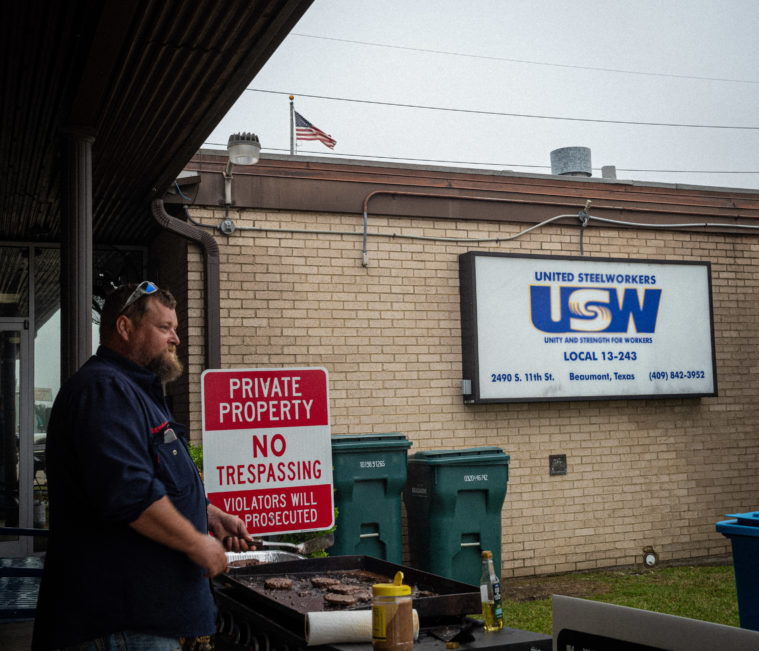Born and raised in Beaumont, Darrell Kyle first started working for ExxonMobil in the 1990s at the blending and packaging plant, which produces Mobil 1 motor oil. It’s part of the company’s sprawling refinery complex that sits on the banks of the Neches River next to Beaumont’s historic Black neighborhood Charlton Pollard. He became an active member of a labor union—Local 13-243—that’s represented refinery workers there since World War II. It’s now a part of the United Steelworkers (USW), an amalgamated industrial union that represents more than 30,000 refinery and petrochemical workers in the United States. The 55-year-old worked his way up through the ranks from shop steward to top leadership, getting elected president in 2015.
With a gravelly drawl and a healthy dose of colorful four-letter words, the union leader makes no secret of how he feels about his employer, one of the world’s most powerful and profitable oil corporations. “Exxon is a company that believes wholeheartedly, it’s my way or the highway: ‘You don’t tell us what to do and you can go take a flying shit,’” Kyle told the Observer in an interview at the union hall last November, seven months into Exxon’s unprecedented lockout of roughly 650 union workers.
A veteran of several contract fights, Kyle has witnessed various ways—some obvious, some subtle—that ExxonMobil has fought to undermine the union’s power. But as he and other union leaders began contract negotiations in January 2021, Kyle could tell that the corporation was taking a harder line. From the first time they met, he said, it was clear that management was gunning for major concessions. Exxon was proposing a contract that would freeze wages for a number of workers and eliminate certain job classifications and seniority rights that the USW had scratched and clawed to secure and protect for decades. “We knew right then and there this [contract] was gonna be a shit pile,” Kyle said.
The union responded with its own counterproposal, which was swiftly rejected by Exxon, declaring it had already made its “last, best, and final offer.” With negotiations stalled, the union then issued notices that it could call for a strike if a deal wasn’t reached before the contract expired on May 1. This time, though, Exxon responded by saying it would lock out the union workers to preempt a strike and began preparing managers and hiring contractors to keep its plants running.
The refinery union was also facing threats from within. Soon after 2021 contract talks launched, some workers began circulating petitions to decertify the union—a process to call a vote to remove the storied United Steelworkers Local as the representative for the Beaumont workers.

The fight is symbolic of a larger struggle between labor unions and Big Oil. And it was playing out inside a refinery that Exxon had long planned to turn into its crown jewel. First built in 1903, the Beaumont refinery is currently the eighth-largest refinery in the country—capable of processing 366,000 barrels of crude oil daily. But it will soon be the largest in North America, once Exxon completes its long-planned construction of a third light crude unit in 2023, expanding capacity by as much as 65 percent.
Exxon said that its contract demands were necessary to ensure that the soon-to-be-expanded refinery would operate at maximum efficiency and profitability in a tumultuous market. The Steelworkers claimed that Exxon had refused to bargain in good faith and was intent on using a prolonged lockout to force a decertification campaign and get rid of the union.
“Obviously, they had one thing on their mind,” Kyle said. “This time, they were goin’ to try to bust this union up. There’s no other reason.”
Local 13-243 wasn’t about to give in without a fight.
“They started off with hardball,” Kyle said. “Well, we played hardball, too.”
For 10 long months, the most powerful energy company in the world and one of the longest-standing refinery union locals in the country would engage in a bitter standoff—marking the longest labor dispute at any U.S. refinery in 40 years. The stakes were immense, with effects rippling far beyond its Beaumont fenceline.
Over the past decade, these sorts of decertification campaigns have become increasingly common at Exxon’s unionized facilities—typically popping up during contract negotiations. First, one happened at the Baton Rouge refinery in 2012, then in Baytown both in 2013 and 2020, and in Beaumont in 2015 and again in 2021. While these efforts gained little traction at first, they’ve found more and more support in subsequent attempts, according to Ricky Brooks, who heads the USW’s national Exxon council. “This company and their anti-union positions, ploys, and tactics—it’s trending across the country,” Brooks said.
While these appear to be organic efforts led by employees fed up with unions, the USW suspects that Exxon has secretly—and illegally—helped orchestrate decertification campaigns in order to weaken and, ultimately, rid itself entirely of all unions that represent its workers.

If the Steelworkers fell in Beaumont, it could expose the increasingly perilous hold the union has in refineries—and undermine its already-waning power to fend off further assaults. The contract provisions that unions won over several decades, that ensure management can’t run roughshod over the roughly 30,000 refinery and petrochemical workers represented by the United Steelworkers, that ensure safety protocols are prioritized, and that protect its members from layoffs and replacement by contract workers could disintegrate.
“Most of us at the smaller plants are afraid if you guys [decertify], it will embolden the rest of these companies to pull something similar next contract,” a worker at another Texas refinery warned in a Facebook post. “You guys are the big dogs and without y’all it’s definitely going to hurt us in contract negotiations.”
On May 1, 2021—the day the union’s contract expired—Exxon managers took workers off their posts and, two by two, escorted them off plant property. All of a sudden, around 650 workers were locked out. This was the first work stoppage at the Beaumont refinery in over 30 years, meaning that few employees had weathered a prior lockout or strike.
But the United Steelworkers was no stranger to heated labor battles—whether lockouts or strikes—against corporate behemoths like Exxon. “The Steelworkers have taken on the biggest. They’ve taken on Exxon before, literally on a global scale. They know this employer, and Exxon knows this union,” said Kate Bronfenbrenner, a labor expert at Cornell University’s School of Industrial and Labor Relations. “They know how to deal with lockouts probably more than any other union, because they’ve been locked out and have won more legal battles over lockouts than any other union.”
The Steelworkers mobilized its resources and launched a series of actions to put public pressure on Exxon to end the “illegal lockout.” It organized protests at corporate headquarters in Irving and outside oil and gas industry conferences. Its allies in Congress—like Michigan Congressman Andy Levin—grilled CEO Darren Woods about the lockout during an October congressional hearing.
Every two weeks, the USW would give members checks to help cover their mortgages, car payments, and other bills. The Beaumont union hall was converted into a makeshift pantry, filled with groceries and other essentials donated by community members and other labor unions.

But with each passing week, the anxiety and desperation grew. The path back to work became more uncertain. The lockout did not appear to be hurting Exxon as much as the union had predicted. The company said that, with managers and newly trained contractors, refinery operations were running at full capacity. Exxon wasn’t budging, confident that it could force the union to bend or break.
By the fall, the lockout had gone on longer than anyone had expected. Six months in, locked-out workers had lost company health care coverage and federal unemployment benefits had expired. Some fared better financially, buoyed by a spouse’s income or a savings account. Many were forced to work side gigs to make ends meet. Some opted for early retirement, while others gave up hope and resigned to work elsewhere.
But diehard union members still believed in the fight.
For P.J. Shaffer, the conflict was personal. For his first 10 years at Exxon, Shaffer worked at the blending and packaging plant (B&P), where wages are lower, the work more strenuous, and the overtime hours more demanding. But three years ago, Shaffer finally had enough seniority to qualify for an operator position in the refinery. “By doing that, I was able to improve my working situation. I moved on to a better job, made more money, had more time off to spend with my family, and it was all based off of my seniority bid,” Shaffer told the Observer at the local’s union hall in November. He was there with his wife and two young children, collecting a week’s groceries and signing up for a turkey dinner for Thanksgiving.
Now Exxon wanted to eliminate seniority bidding, ensuring that management would control all hiring decisions. “If they do away with it, there’s going to be a bunch of people that are stuck at B&P and they can’t go anywhere,” Shaffer said—perhaps because you don’t get along with a supervisor, you’re too valuable in your current position. “You’re stuck and you’ll never be able to do the better job or the easier job or the job that you really want.”
The issue of seniority bidding, and other measures that would affect the more than 100 B&P workers, were central to this fight. The most active and vocal members of the union—and its elected leadership—came from the blending plant. Shaffer owed his job at the refinery to the union, and he was committed to the fight so his former co-workers might get that same opportunity. But in the refinery, he saw that more workers were uninvolved in the union or weren’t dues-paying members and less committed to the union’s fight. “When we first went out,” Shaffer said, “I had guys in the refinery calling to ask where the union hall was.”
In October, Exxon put a new contract offer on the table, which included minor changes and a ratification bonus, to a vote. But the union leaders believed they could still hold out for more and urged members to reject it. Hundreds of members showed up to vote. The union announced the contract was rejected by an “overwhelming” majority, though it declined to release the ballot count.
For many, this was a show of force to Exxon that the union wasn’t going to fold. For others, it was cause for despair.
Hanging on the wall in the Local 13-243 union hall in Beaumont is the certificate—in a glass frame—of the local’s original charter with the Oil Workers International Union, signed on November 1, 1943. After decades of struggle to organize in the Texas oil industry, the local arose from an intensive union drive by the Oil Workers International Union, which then represented workers in oil refineries that lined the Gulf Coast.
In the face of racism, police violence, and rampant exploitation, workers formed unions, fighting giant refinery owners for better pay, job security, and safety as they toiled inside units filled with toxic and explosive chemicals and where death, fire, and explosions were more common than in almost any other type of workplace.
Beaumont and the other refinery towns of southeast Texas—Port Arthur, Baytown, Galveston, Texas City—grew into a mighty bastion for labor unionism that upended the region’s unchecked power structures and politics and secured critical wage and safety improvements. But that power peaked by mid-century and, since then, these refinery unions have greatly diminished—like organized labor nationwide—in sheer numbers, membership, and influence, while oil companies remain some of the world’s most powerful corporations.
Still, unions have fought hard to retain their foothold in many of the biggest refineries that sit along the Texas Gulf Coast. For nearly 80 years, Local 13-243 has represented generations of workers who’ve clocked in for shifts each day at the refinery on the banks of the Neches River, even as mergers have brought about change in ownership and union affiliation over the years. Mobil owned the refinery for decades before merging with Exxon in 1998. The Beaumont Local, along with the rest of the unionized refinery workers, merged with United Steelworkers International in 2005.
In many ways, the precarious position of Local 13-243 was established six years before the lockout. Since the 1960s, the oil workers’ union—in its various iterations—has bargained national contracts with the major oil companies that set wage and safety standards for all workers. Known as the National Oil Bargaining Program, every unionized plant was set on the same contract pattern, providing them with tremendous leverage. With every facility on the same bargaining schedule, the union could effectively use the threat of a unified strike.
For 10 long months, the largest energy company in the world and one of the longest-standing refinery union locals in the country would engage in a bitter standoff.
In 2015, when oil companies demanded a contract rife with concessions, the USW took a stand with a nationwide refinery strike—the first since 1980—that brought thousands of workers out on the picket lines. Texas was the epicenter of that struggle, with union members striking against the massive Motiva refinery in Port Arthur, at the Shell refinery in Deer Park, and at Marathon in Galveston, among others. But the Steelworkers didn’t include every one of its union refineries in the strike: most notably, Beaumont stayed on the sidelines. Local 13-243 kept its members on the job while its bargaining committee continued negotiations with Exxon on rolling 24-hour contract extensions.
The company had already unveiled its expansion plans by then and, with strikes raging at rival refineries, Exxon was demanding a six-year contract that would take its Beaumont facility off the national pattern in order to avoid a future strike that could disrupt the project. Initially, the union blasted Exxon’s insistence on a contract that took Beaumont off-pattern, saying that it would “isolate” the local and undermine its bargaining position. But when Exxon refused to budge, USW leaders ultimately advised members to ratify the deal.
Six years later, many of the locked-out workers looked back at that 2015 vote as the origin of their current predicament. Exxon got what it wanted then, and it was back for more. This time, Local 13-243 was facing down the titan of Big Oil alone.
After union members voted down a contract in October, a growing group of dissenters was now pushing harder than ever to decertify the union. Some members saw it as a way to push their leaders to end the unpopular lockout.
“Originally, my reasoning for signing the [decertification] petition was not to get rid of the union,” said William Humble, who’s worked in the refinery for eight years. “My original intent was to help us reach the 30 percent threshold to trigger an election.” As he saw it, this could prompt the USW International to “come down and pretty much force the local to put whatever offer on table to vote, because they don’t wanna lose the union.”
The union itself was already pursuing another strategy. The Steelworkers’ lawyers had filed a series of unfair labor practice charges with the National Labor Relations Board (NLRB), including one that accused Exxon of illegally abetting decertification by providing an employee with decertification information, along with a list of employees’ email addresses and use of the company’s email system. USW also claimed that an employee was allowed to keep a lockbox on company property to store petitions. Union leaders believed that if the NLRB found that Exxon had violated the law, the company could be ordered to end the lockout and give back pay, with interest, to workers. That would be a moonshot victory, but it would take a long time to get through the federal bureaucracy—and Exxon denied any wrongdoing.
In the spring, the USW officials had dismissed the decertification effort as a small and loud band of anti-union employees. But by early October, more than 30 percent of the locked-out workers had signed the decertification petition, which triggered an NLRB election to vote on whether the union would continue to represent them.
The organizers of the decertification campaign set up Facebook groups for those who were fed up with the union’s leadership and the lockout—“a place where everyone can get the raw truth as to what’s really going on.” Those pages became a highly active clearinghouse for information, opinions, and debate, as well as plenty of rumors, gossip, and misinformation about the decertification campaign, the lockout, the union, and the company. As those workers saw it, the union’s leadership had recklessly led them into an unwinnable fight that cost them months of pay.

As the decertification petition reached the needed threshold and the NLRB called an election, Exxon amped up its pressure on the locked-out workers to oust the union—framing it as their best shot to get back to work. “The Company supports employees’ right to choose whether they wish to be represented,” Exxon wrote in an online bulletin in October. “Most of us were not born when the union first started in Beaumont during the 1940s. The world is a different place. It’s time for you to have a say. In fact, 94% of private US workers do not have a union. There are many good reasons for this.”
Another bulletin read: “While it’s completely your decision, and we are prohibited from making promises about pay or benefits, we hope you give us a chance and vote ‘No.’” The company also posted salary and benefit details comparing the unionized Beaumont complex with Exxon’s non-union chemical plant next door: “Again, we are not allowed to make promises, and we will not do so. We can report that non-represented employees at comparable sites are paid 5% to 7% more and have similar benefits.”
The Steelworkers responded with another unfair labor practices complaint, arguing that the company was illegally coercing workers with implicit promises if they voted to get rid of the union. This effectively ensured that the NLRB would impound the ballots after the late-December election deadline while it investigated the allegations.
Exxon managers have denied all of those claims. “The Company remains confident that it acted lawfully at all times and will prevail against the Union’s baseless allegations,” Exxon said in a statement to the Observer.
In January 2022—one year since negotiations began—things were at a standstill. With ballots impounded, decertification leaders continued gathering signatures and claimed to be dangerously close to the 50 percent mark. Under federal law, that level of support would allow Exxon to unilaterally declare that the Steelworkers no longer represented its workers. No other USW refinery union had come this close to being decertified and the local leaders were feeling the heat. If something didn’t happen soon, they might lose the union.
Meanwhile, USW International had begun the latest round of national contract bargaining—and things weren’t looking promising there, either. The industry’s bargaining representative—Marathon—was refusing to budge on its own “final” offer after the union rejected it outright, though it declined to call another strike. In parallel local negotiations, oil giant BP was pushing hard for contract provisions that would effectively move its unionized refineries in the U.S. off the national pattern. The USW balked, pointing to the Beaumont lockout as a warning of what that could invite. “We don’t believe Exxon is the best example to follow,” a USW official said. In late February, the union announced a tentative agreement with the oil companies for a national contract that provided average annual wage hikes of 3 percent for union workers over the next four years.
Back in Beaumont, the local’s bargaining committee started up talks again, and by early February, Exxon put another offer on the table. Within days, the chairman of Local 13-243’s bargaining committee issued a message announcing that USW leadership would call for a vote. “We are not throwing in the towel, giving up or quitting,” he wrote. “It’s just time for you to tell us [the] path forward.”
Exxon still hadn’t budged on any of the union’s biggest concerns. But the company slightly amended its contract offer, adding a paid holiday for Martin Luther King Jr. Day, among other minor changes. This was a far cry from what the union had been fighting for over the past year—and certainly no better than the offer it had voted down in October.
On a cloudy, blustery afternoon, President’s Day, pickup trucks packed into the large parking lot of the local electricians’ union hall and far down along the road. Hundreds of workers filed inside the hall, where union officials had called a meeting to present and vote on the company’s latest offer. The mood was tense, even grim. Then, packed into the hall’s main room, Local 13-243’s leadership stood before more than 200 members and explained the reality.
Over the course of three hours, members deliberated the details of the contract and then ultimately cast their votes with yeas on one side of the room, and nays on the other. Around 6:30 p.m., the union announced the results: Workers approved the contract by a vote of 214-133. The lockout would soon be over.
The union and its members held out against Exxon for nearly 10 months but came out on the other end of this landmark labor fight battered, bruised, and weakened.
The local was more embattled, and its membership more embittered and divided, than ever. Under the new contract, many workers won’t see raises for years. Some worry they could now be moved to new units or positions based on a manager’s whim and that their years of seniority will no longer provide a pathway to a promotion.
“The membership spoke,” Bryan Gross, the USW’s staff representative, told the Observer after the vote. “There’s a lot of people that voted to accept this offer tonight that voted against it in October. That additional four or five months makes a difference. It makes people reconsider. And I believe Exxon knew that.”
On March 14, a week after Exxon workers had returned to their jobs, the NLRB opened and counted the ballots cast in last year’s decertification election. With a narrow majority of 52 percent, workers had opted to keep their union—258 in favor, 229 against. Local 13-243 had survived to fight another day; under federal law, employees would be prohibited from trying to decertify the union for three years. Opponents of the USW are already girding for another shot.
“I do NOT believe USW will be so lucky next time. Your days at XOM Beaumont are numbered USW!,” one employee who led the decertification drive wrote on Facebook. “The Decert Effort has more than 100 new XOM employees who can’t wait to give you the boot in three to five years! Next time we swing, we won’t miss!”






